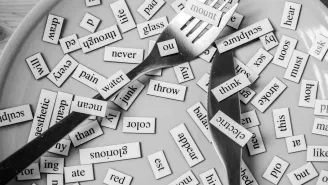IELTS Vocabulary: What is it All About?
By definition, vocabulary just means words! But remember, it does not have to be just a word. IELTS Vocabulary consists of idioms or phrasal verbs, which we’ll explore below.
Expanding your IELTS Vocabulary is crucial for achieving a high score, as it demonstrates your ability to use language effectively in different contexts. As part of language evaluation, IELTS measures your vocabulary range, called ‘Lexical Resource.’ This band descriptor accounts for 25% of your IELTS scores.
Here’s what it checks:
- Are you using the right words in the proper context?
- Are you following all the grammar rules when using this word?
- Are you able to use unusual and uncommon words relevantly?
IELTS Vocabulary is put to use differently in each of the four skills. For instance, the IELTS Speaking Vocabulary will consist of conversational words, nothing too over-the-board or academic.
On the other hand, while preparing for IELTS Reading, Writing or Listening, you will need to add more sophisticated words to your bank! This is because the passages, audio and essay topics are slightly more academic/formal in nature.
Therefore, your preparation strategies for IELTS Vocabulary should be specific to the section you’re preparing for.
Below is a list of IELTS vocabulary words arranged as per categories/topics!
IELTS Vocabulary List: Phrasal Verbs
Phrasal verbs are a combination of verbs and prepositions or adverbs. Most times, phrasal verbs don’t mean what they indicate, LITERALLY! For example, the phrase ‘look after him’ does not indicate that you must look behind or after the person has walked past or moved.
Instead, it means “take care of him.”
Understanding phrasal words can be tricky to start with, but as you learn, it will become easier, more interesting, and even fun!
Here are some phrasal verbs from IELTS Vocabulary you can start using today!
IELTS Vocabulary List: Idioms
Idioms, much like phrasal verbs, don’t always indicate what they mean. Idioms are flowery sentences framed together for effect, humour and poetry. Idioms originate from cultural experiences or historical references.
For example, when someone says, “This is a piece of cake!” They are not talking about a real slice of cake. They are simply implying that this (some task) is very easy to do.
Usage of Idioms indicates a high level of expertise in the English language, which is why using them during IELTS may get you brownie points!
Here are some Idioms to learn today!
Tips To Improve Vocabulary Words for IELTS
To score well in the lexical resource part of the test, it’s important that you not only know the words but understand them and can pronounce them correctly. Here are the top 5 tips to help you improve Vocabulary words for IELTS!
- Read all you can: The best way to learn new words is to read! Read newspapers, books, magazines, blogs, and anything else. If you spot a new word, note it and find its meaning.
- Watch and Observe: When watching TV shows or movies or chatting with people, pay attention to the words used. It's an easy and effective way to learn new vocabulary without much effort!
- Play word games: Another easy trick if you have little time to build your vocabulary. Games like Wordle and Scribbl are fun plus educative.
- Practice: Learning a new word is not enough. You must practice using it in different contexts. You should also practice pronunciation!
- Set Goals: If vocabulary is your weak point, try setting goals to learn a certain number of words every week. Maintain a journal to record the words and track your progress.








